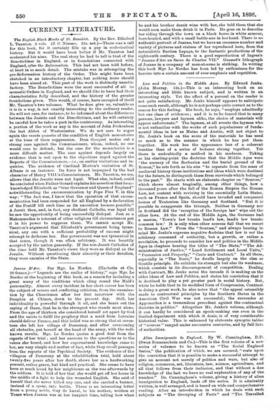Law and Politics in the Middle Ages. By Edward Jenks..
(John Murray. 12s.)—This is an interesting book on an interesting and little known subject, and is written in an interesting style. Yet the effect of a perusal on the reader is not quite satisfactory. Mr. Jenks himself appears to anticipate some such result, although he is not perhaps quite correct as to the reason for this feeling. His book, he says, "employs admittedly but one class of evidences ; and it is to be feared that to many persons, lawyers and laymen alike, the choice of materials will appear unfortunate." The layman, at all events the layman who is not unfamiliar with the works of such popularisers of funda- mental ideas in law as Maine and Austin, will not object to Mr. Jenks's book on the score of the materials he has used so much as to the manner in which he has put them together. His work has the appearance less of a coherent treatise than of a series of lectures strung together. Yet there is undoubtedly a method in his madness. Taking as his starting-point the doctrine that the Middle Ages were the nursery of the Barbarian and the burial ground of the Roman," he sets forth as his aim "to separate from the mass of mediaeval history those institutions and ideas which were destined for the future, to distinguish them from survivals which belonged to the past." He starts with an elaborate chapter on " Sources,"' which shows almost tragically, among other things, how a. thousand years after the fall of the Roman Empire the Roman Law, not content with reviving in the essentially Latin States,, such as France and Spain, should have invaded and conquered homes of Teutonism like Germany and Scotland. "But it is possible to exaggerate the triumph. Neither in Germany nor in Scotland did the reception of the foreign law' wipe out the other laws. At the end of the Middle Ages, the Germans had a maxim, ' Town's law breaks land's law, land's law breaks common law.' It is only when other sources fail that we resort. to Roman Law." From the "Sources," and always bearing in. mind Mr. Jenks's supreme negative doctrine that law is not the arbitrary command of authority, but a growth, or rather a, revelation, he proceeds to consider law and politics in the Middle Ages in chapters bearing the titles of " The State," " The Ad- ministration of Justice," " Land Settlement and Local Units," "Possession and Property," "Caste and Contract." In all these, especially in "The State," he dwells largely on the clan or Gentile principle. He exhibits its strength but also its weakness, which consists in its discouragement of competition. Dealing with Contract, Mr. Jenks notes the inroads it is making on the older ideas of Law and Politics, and states his conviction that it is destined to play a yet greater part in social history. But„ while he holds that in its modified form of Compromise, Contract is doing a great work, he also notes that " the appeal ostensibly made to contractual principles by the Southern States in the American Civil War was not successful; the surrender at• Appomattox is a tremendous precedent against the contractual doctrine in politics." Altogether Mr. Jenks's volume, although. it can hardly be considered an epoch-making one even in the limited department with which. it deals, is of very considerable historical value. This is enhanced by elaborate synoptic tables of "sources" ranged under successive centuries, and by full lists of authorities.


































 Previous page
Previous page